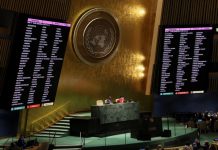Violent protests broke out across Italy on Monday over new restrictions to curb the country’s second wave of Covid-19.
Clashes were reported in several major cities – including Turin, where petrol bombs were thrown at officers.
In Milan, tear gas was used to disperse protesters, while violence was also reported in Naples.
The demonstrations began soon after the national government’s order to close restaurants, bars, gyms and cinemas came into effect at 18:00 local time.
Many regions have also imposed night-time curfews – including Lombardy, where Milan is, and Piedmont, where Turin is.
Protests took place in about a dozen other cities, including Rome, Genoa, Palermo and Trieste.
While an initial national lockdown earlier this year was complied with peacefully, the announcement of renewed measures has been met with immediate pushback.
Small businesses argue that they are still recovering from that first lockdown, and that more restrictions could bankrupt them.
A number of luxury stores in central Turin, including a Gucci boutique, were ransacked by crowds that spilled into the streets after the rules came into force.
Demonstrators let off firecrackers and lit flares, while police in riot gear responded with tear gas.
In Milan, crowds chanted “Freedom, freedom, freedom!” as they clashed with police in the city centre. The city is the capital of Lombardy, which has been particularly hard hit by the virus.
What measures has Italy introduced?
Restaurants, bars and cafes must stop table service at 18:00 and offer only take-away until midnight. Contact sports are prohibited but shops and most businesses will remain open.
The new restrictions, which are in force until 24 November, will also see 75% of classes at Italy’s high schools and universities conducted online instead of in a classroom.
Regional governments had asked for all classes to be conducted via distance learning, Italian media reported, but the move was opposed by Education Minister Lucia Azzolina.
The government is also urging people not to travel outside their home towns or cities unless absolutely necessary and to avoid using public transport if possible.
“We think that we will suffer a bit this month but by gritting our teeth with these restrictions, we’ll be able to breathe again in December,” Prime Minister Giuseppe Conte told a news conference on Sunday.









